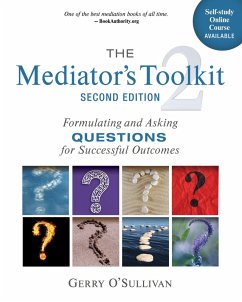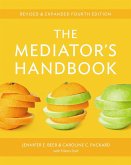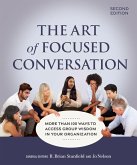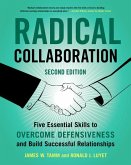Gerry O'Sullivan
The Mediator's Toolkit, Second Edition
Formulating and Asking Questions for Successful Outcomes
Gerry O'Sullivan
The Mediator's Toolkit, Second Edition
Formulating and Asking Questions for Successful Outcomes
- Broschiertes Buch
- Merkliste
- Auf die Merkliste
- Bewerten Bewerten
- Teilen
- Produkt teilen
- Produkterinnerung
- Produkterinnerung
The Mediator's Toolkit, 2nd Edition is an essential guide to posing powerful questions that get to the core of an issue, shift perspectives, and challenge entrenched thinking. Fully revised and updated, it delivers advanced techniques to gain increased insight and achieve successful conflict resolution in any context.
Andere Kunden interessierten sich auch für
![The Mediator's Handbook The Mediator's Handbook]() Beer, Dr. Jennifer E., PhDThe Mediator's Handbook33,99 €
Beer, Dr. Jennifer E., PhDThe Mediator's Handbook33,99 €![The Art of Focused Conversation, Second Edition The Art of Focused Conversation, Second Edition]() The Art of Focused Conversation, Second Edition26,99 €
The Art of Focused Conversation, Second Edition26,99 €![Kissinger the Negotiator Kissinger the Negotiator]() James K. SebeniusKissinger the Negotiator27,99 €
James K. SebeniusKissinger the Negotiator27,99 €![Getting to Yes Getting to Yes]() Roger FisherGetting to Yes23,99 €
Roger FisherGetting to Yes23,99 €![Collaborating with the Enemy Collaborating with the Enemy]() KAHANECollaborating with the Enemy17,99 €
KAHANECollaborating with the Enemy17,99 €![Radical Collaboration Radical Collaboration]() James W. TammRadical Collaboration19,99 €
James W. TammRadical Collaboration19,99 €![Winning from Within Winning from Within]() Erica Ariel FoxWinning from Within25,99 €
Erica Ariel FoxWinning from Within25,99 €-
-
-
The Mediator's Toolkit, 2nd Edition is an essential guide to posing powerful questions that get to the core of an issue, shift perspectives, and challenge entrenched thinking. Fully revised and updated, it delivers advanced techniques to gain increased insight and achieve successful conflict resolution in any context.
Produktdetails
- Produktdetails
- Verlag: New Society Publishers
- Second Edition
- Seitenzahl: 304
- Erscheinungstermin: 10. Juni 2025
- Englisch
- Abmessung: 249mm x 201mm x 20mm
- Gewicht: 632g
- ISBN-13: 9781774060247
- ISBN-10: 1774060248
- Artikelnr.: 73409747
- Herstellerkennzeichnung
- Libri GmbH
- Europaallee 1
- 36244 Bad Hersfeld
- gpsr@libri.de
- Verlag: New Society Publishers
- Second Edition
- Seitenzahl: 304
- Erscheinungstermin: 10. Juni 2025
- Englisch
- Abmessung: 249mm x 201mm x 20mm
- Gewicht: 632g
- ISBN-13: 9781774060247
- ISBN-10: 1774060248
- Artikelnr.: 73409747
- Herstellerkennzeichnung
- Libri GmbH
- Europaallee 1
- 36244 Bad Hersfeld
- gpsr@libri.de
Gerry O'Sullivan is an award-winning mediator recognized for her commitment to fostering collaboration and unity in the global mediation community. A trainer and facilitator with over 35 years of experience in conflict resolution, she delivered Mediators' Institute of Ireland (MII) accredited mediation professional development sessions for many years, and holds a Diploma in Adult and Continuing Education. Gerry is the author of the original edition of The Mediator's Toolkit: Formulating and Asking Questions for Successful Outcomes, and conducts in person and online workshops and courses locally and internationally based on her book. She is Director of O'Sullivan Solutions and lives in Maharees, Castlegregory on the southwest coast of Ireland.
Acknowledgments
Glossary
Introduction
Section 1: The S Questions Model - Theory
Chapter 1: Introduction and Purpose of the S Questions Model
Chapter 2: How We Process and Communicate Information and
Thought-Flow-Tracking
Chapter 3: Working with the Brain in Mediation
Section 2: Practical Application of the S Questions Model
Chapter 4: Methodology to Minimize an Avoid-threat Reflex When Asking
Questions
Chapter 5: The S Questions Model Applied to a Mediation Process
Section 3: Practical Application of S1, S2 and S3 Questions
Chapter 6: S1: The Subject Matter Dimension of Questions
Chapter 7: S2: The Structure Dimension of Questions
Chapter 8: S3: The Seeking Information Dimension of Questions
Section 4: Practical Application of S4 Questions
Chapter 9: Introduction: The Eight Types of S4: Shift Thinking Dimension of
Questions
Chapter 10: S4: Journey of Inference Questions
Chapter 11: S4: Neuro-Linguistic Programming Questions
Chapter 12: S4: Distinction and Difference Questions
Chapter 13: S4: Reflective Connecting Questions
Chapter 14: S4: Cognitive Elements-based Questions
Chapter 15: S4: Other People Questions
Chapter 16: S4: Underlying Interests Questions
Chapter 17: S4: Future Focus Questions
Endnotes
Index
About the Author
A Note about the Publisher
Glossary
Introduction
Section 1: The S Questions Model - Theory
Chapter 1: Introduction and Purpose of the S Questions Model
Chapter 2: How We Process and Communicate Information and
Thought-Flow-Tracking
Chapter 3: Working with the Brain in Mediation
Section 2: Practical Application of the S Questions Model
Chapter 4: Methodology to Minimize an Avoid-threat Reflex When Asking
Questions
Chapter 5: The S Questions Model Applied to a Mediation Process
Section 3: Practical Application of S1, S2 and S3 Questions
Chapter 6: S1: The Subject Matter Dimension of Questions
Chapter 7: S2: The Structure Dimension of Questions
Chapter 8: S3: The Seeking Information Dimension of Questions
Section 4: Practical Application of S4 Questions
Chapter 9: Introduction: The Eight Types of S4: Shift Thinking Dimension of
Questions
Chapter 10: S4: Journey of Inference Questions
Chapter 11: S4: Neuro-Linguistic Programming Questions
Chapter 12: S4: Distinction and Difference Questions
Chapter 13: S4: Reflective Connecting Questions
Chapter 14: S4: Cognitive Elements-based Questions
Chapter 15: S4: Other People Questions
Chapter 16: S4: Underlying Interests Questions
Chapter 17: S4: Future Focus Questions
Endnotes
Index
About the Author
A Note about the Publisher
Acknowledgments
Glossary
Introduction
Section 1: The S Questions Model - Theory
Chapter 1: Introduction and Purpose of the S Questions Model
Chapter 2: How We Process and Communicate Information and
Thought-Flow-Tracking
Chapter 3: Working with the Brain in Mediation
Section 2: Practical Application of the S Questions Model
Chapter 4: Methodology to Minimize an Avoid-threat Reflex When Asking
Questions
Chapter 5: The S Questions Model Applied to a Mediation Process
Section 3: Practical Application of S1, S2 and S3 Questions
Chapter 6: S1: The Subject Matter Dimension of Questions
Chapter 7: S2: The Structure Dimension of Questions
Chapter 8: S3: The Seeking Information Dimension of Questions
Section 4: Practical Application of S4 Questions
Chapter 9: Introduction: The Eight Types of S4: Shift Thinking Dimension of
Questions
Chapter 10: S4: Journey of Inference Questions
Chapter 11: S4: Neuro-Linguistic Programming Questions
Chapter 12: S4: Distinction and Difference Questions
Chapter 13: S4: Reflective Connecting Questions
Chapter 14: S4: Cognitive Elements-based Questions
Chapter 15: S4: Other People Questions
Chapter 16: S4: Underlying Interests Questions
Chapter 17: S4: Future Focus Questions
Endnotes
Index
About the Author
A Note about the Publisher
Glossary
Introduction
Section 1: The S Questions Model - Theory
Chapter 1: Introduction and Purpose of the S Questions Model
Chapter 2: How We Process and Communicate Information and
Thought-Flow-Tracking
Chapter 3: Working with the Brain in Mediation
Section 2: Practical Application of the S Questions Model
Chapter 4: Methodology to Minimize an Avoid-threat Reflex When Asking
Questions
Chapter 5: The S Questions Model Applied to a Mediation Process
Section 3: Practical Application of S1, S2 and S3 Questions
Chapter 6: S1: The Subject Matter Dimension of Questions
Chapter 7: S2: The Structure Dimension of Questions
Chapter 8: S3: The Seeking Information Dimension of Questions
Section 4: Practical Application of S4 Questions
Chapter 9: Introduction: The Eight Types of S4: Shift Thinking Dimension of
Questions
Chapter 10: S4: Journey of Inference Questions
Chapter 11: S4: Neuro-Linguistic Programming Questions
Chapter 12: S4: Distinction and Difference Questions
Chapter 13: S4: Reflective Connecting Questions
Chapter 14: S4: Cognitive Elements-based Questions
Chapter 15: S4: Other People Questions
Chapter 16: S4: Underlying Interests Questions
Chapter 17: S4: Future Focus Questions
Endnotes
Index
About the Author
A Note about the Publisher








